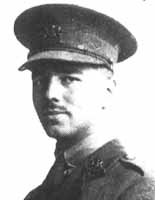Theosophical Society,
Biography of
Wilfred Owen

Wilfred Edward Salter Owen MC
(March 18, 1893 – November 4, 1918)
Wilfred Edward
Salter Owen MC was a British poet and soldier, regarded by many as the leading
poet of the First World War. His shocking, realistic war poetry on the horrors
of trench and gas warfare was heavily influenced by his friend Siegfried
Sassoon and sat in stark contrast to both the public perception of war at the
time, and to the confidently patriotic verse written earlier by war poets such
as Rupert Brooke. Some of his best-known works—most of which were published
posthumously—include Dulce Et Decorum Est, Anthem for Doomed Youth, Futility, and Strange
Meeting. His preface intended for a book of poems to be published in 1919
contains numerous well-known phrases, especially 'War, and the pity of War',
and 'the Poetry is in the pity'.
He is perhaps
just as well-known for having been killed in action at the
Owen was born
the eldest of four children at Plas Wilmot, a house
near Oswestry in
Shortly after
leaving school in 1911, Owen passed the matriculation exam for the
On
After a
period of convalescence in
After
returning to the front, Owen led units of the Second Manchesters
on
Owen is
regarded by some as the leading poet of the First World War, known for his war
poetry on the horrors of trench and gas warfare. His great friend, the
contemporary poet Siegfried Sassoon had a profound effect on Owen's poetic voice, and Owen's
most famous poems (Dulce et Decorum Est and Anthem for Doomed Youth) show direct results of
Sassoon's influence. Manuscript copies of the poems survive, annotated in
Sassoon's handwriting. Owen's poetry would eventually
be more widely acclaimed than that of his mentor. While his use of pararhyme, with its heavy reliance on consonance, was both
innovative and, in some of his works, quite brilliant, he was not the only poet
at the time to utilize these particular techniques. He was, however, one of the
first to experiment with it extensively.
As for his
poetry itself, it underwent significant changes in 1917. As a part of his
therapy at Craiglockhart, Owen's
doctor, Arthur Brock, encouraged Owen to translate his experiences,
specifically the experiences he relived in his dreams, into poetry. Sassoon,
who was becoming influenced by Freudian psychoanalysis, aided him here, showing
Owen through example what poetry could do. Sassoon's use of satire influenced
Owen, who tried his hand at writing "in Sassoon's style." Further,
the content of Owen's verse was undeniably changed by
his work with Sassoon. Sassoon's emphasis on realism and 'writing from
experience' was not exactly unheard of to Owen, but it was not a style of which
he had previously made use--his earlier body of work consists primarily of light-hearted
sonnets. Sassoon himself contributed to this growth in Owen by his strong
promotion of Owen's poetry, both before and after Owen's death: Sassoon was one of Owen's
first editors. Nevertheless, Owen's poetry is quite
distinctive, and he is generally considered a greater poet than Sassoon.
Thousands of
poems were published during the war, but very few of them had the benefit of
such strong patronage, and it is as a result of Sassoon's influence, as well as
support from Edith Sitwell and the editing of his
poems into a new anthology in 1931 by Edmund Blunden
that ensured his popularity, coupled with a revival of interest in his poetry
in the 1960s which plucked him out of a relatively exclusive readership into
the public eye.
Though he had
plans for a volume of verse, for which he had written a "Preface,"
few realize that he never saw his own work published, apart from those poems he
included in The Hydra, the magazine he edited at the
Theosophical Society,
For more info on Theosophy
Try these
Dave’s
Streetwise Theosophy Boards
This
is for everybody not just people in Wales
Cardiff Lodge’s Instant Guide to Theosophy
One Liners & Quick Explanations
The Most Basic Theosophy Website in the Universe
If you run a
Theosophy Group you can use
this as an
introductory handout
The
South of Heaven Guide to
Theosophy and Devachan
The Spiritual Home of Urban Theosophy
The Earth Base for Evolutionary Theosophy
Try these if you are looking
for a
local Theosophy Group or Centre
UK Listing of Theosophical Groups
Worldwide Directory of Theosophical Links